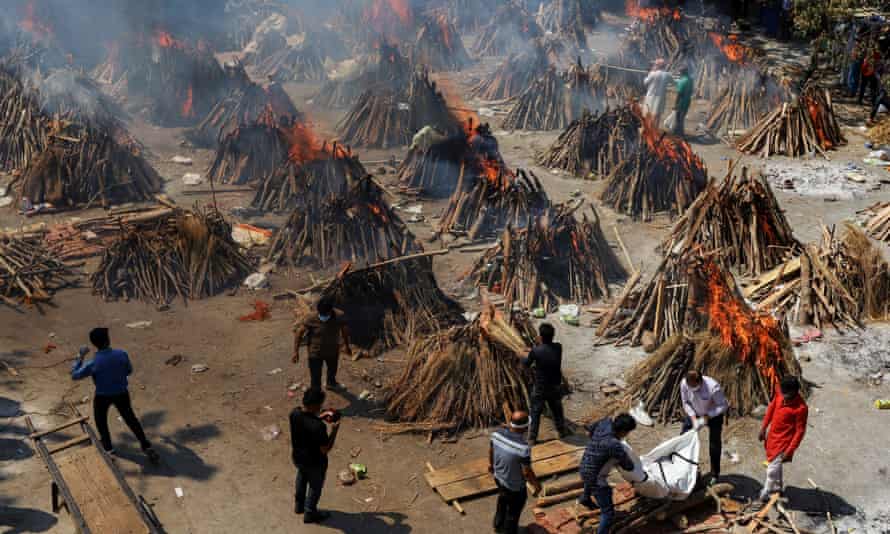International efforts to help India fight its devastating coronavirus crisis have stepped up as the White House said the US would immediately provide raw materials for vaccine manufacture and the UK announced it had dispatched ventilators and oxygen to Delhi.
France and Germany are also set to send much-needed oxygen to India in the coming days as it battles the world’s worst outbreak. Pakistan, a traditional foe, offered medical equipment and supplies after the prime minister, Imran Khan, tweeted prayers for a “speedy recovery”.
India reported 349,691 new cases on Sunday, a record increase for the fourth consecutive day, and 2,767 people dead. Hospitals are running short of life-saving oxygen and patients are dying while they wait to see doctors.
It is feared that the official statistics and a death toll of 192,311 are underestimating the scale of the crisis as experts believe many people are not going to get tested, or lack access to healthcare.
Narendra Modi, the Indian prime minister, said the country was facing a “storm” of infections. “Our spirits were high after successfully dealing with the first wave,” he said in a radio address on Sunday. “But this storm has shaken the nation.”
The US had been facing increasing pressure to lift export controls on raw materials intended to boost its own domestic vaccine supply, which Indian vaccine manufacturers said was slowing down their ability to produce jabs.
The National Security Council spokeswoman, Emily Horne, said in a statement that the US would send raw materials required for India to manufacture the AstraZeneca vaccine, as well as therapeutics, rapid diagnostic test kits, ventilators and protective equipment for frontline workers. “The United States is working around the clock to deploy available resources and supplies,” she said.
The UK package includes 495 oxygen concentrators, which can extract oxygen from the air when hospital systems have run out, 120 non-invasive ventilators and 20 manual ventilators. It is expected to arrive in Delhi on Tuesday with further shipments later in the week.
Boris Johnson, the UK prime minister, said Britain stood “side by side with India as a friend and partner […] I’m determined to make sure that the UK does everything it can to support the international community in the global fight against pandemic.”
The US president, Joe Biden, has previously said the US will not supply vaccines to other countries until it has enough supplies at home but the US’s top infectious diseases expert, Anthony Fauci, said on Sunday the US would review how to help increase India’s vaccine supply or helping them “to essentially make vaccines themselves”. India is one of the world’s largest vaccine manufacturers.
Ashish Jha, the dean of the Brown University School of Public Health in Providence, Rhode Island, urged the Biden administration to go further and share excess vaccines with India and other countries in crisis, pointing out that the US had an estimated 30m unused doses of the AstraZeneca vaccine that has not been authorised by US regulators. The calls were echoed by the author Salman Rushdie, who said: “The US has something like a vaccine glut. India is in dire straits.”
The unprecedented spread of the virus has overwhelmed hospitals in major cities, which continue to face severe shortages of beds and oxygen.
Burial grounds in Delhi are running out of space with funeral pyres lighting up the night sky in other badly hit cities. In the central city of Bhopal, some crematoriums have increased their capacity from dozens of pyres to more than 50.

Workers at the city’s Bhadbhada Vishram Ghat crematorium said they cremated more than 110 people on Saturday, even as government figures in the entire city of 1.8 million put the total number of virus deaths at just 10. “The virus is swallowing our city’s people like a monster,” said Mamtesh Sharma, an official at the site told the Associated Press.
Modi’s government has faced mounting questions since the resurgence of the pandemic over its lax safety measures and failure to prepare for a rise in cases. It emerged on Sunday that Indian officials were attempting to censor such criticism, after Twitter confirmed it had blocked dozens of critical tweets following a legal demand from New Delhi.
A woman mourning the loss of her younger brother, age 50, after he was turned away by two hospitals and died waiting to be seen at a third blamed Modi for the crisis in a video shot by India’s weekly magazine The Caravan. “He has lit funeral pyres in every house,” she said.
The government has in response deployed special trains to move tanks of oxygen from steel plants to hospitals across the country in an effort to allow greater access to medical care. More than 500 oxygen-generation plants were also to be set up in government hospitals, the health ministry said on Sunday.
It said last week it planned to make vaccines available to all adults aged over 18 from 1 May, but the Serum Institute of India (SII), which manufactures the AstraZeneca vaccine, has warned it will not be able to meet its projected targets.
The SII also manufactures vaccines for the international Covax programme intended to help the developing world, which is set to deliver only one in five of the doses it had estimated it would supply by May.
Adar Poonawalla, the chief executive, appealed to Biden earlier this month to lift restrictions on supplies needed for production. “I humbly request you to lift the embargo of raw material exports out of the US so that vaccine production can ramp up. Your administration has the details,” he said on Twitter.
India, which has embarked on the world’s largest vaccination drive, has administered more than 140m doses of vaccine. So far, 8.47% of people have received one dose, and 1.55% are fully vaccinated.
This content first appear on the guardian
